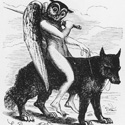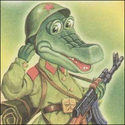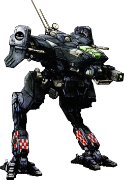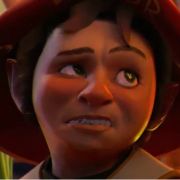|
I'll weigh in here just because I used to read a lot of horror. The problem with H. P. Lovecraft is that he pioneered a unique style that, depending on who you ask, is either "so bad its good" or "brilliant" (some of his fans, like myself, cannot make up their minds on this question). Lovecraft is also, coincidentally, a great example of plot driven fiction - he is terrible at characterization, even worse at dialogue and can barely even pretend to find human subjects interesting. His best stories tend to take the form of suicide notes or journals or missives written by an academic who has slowly gone mad due to the terrible revelations he uncovered in the course of his research. You might check out 'Call of Cthulhu' since its easily available online, but on the whole I don't think Lovecraft is the kind of author you should turn to if you're looking for inspiration when writing. He's just so uniquely himself that it would be like trying to become a great painter by immediately imitating Picasso or something. That having been said, some other classical works by Lovecraft worth checking out would be 'The Rat's in the Walls', 'Pickman's Model', 'Herbert West, Reanimator' and 'The Thing on the Doorstep'. 'The Colour Out of Space' is also kinda neat if only because it seems to predict the effects of radiation poisoning before anyone had any idea what that was. Other stories I might recommend in a horror vein: The Tell-Tale Heart and The Cask of Amontillado by Edgar Allen Poe (also check out The Masque of the Red Death, the Fall of the HOuse of Usher and THe Murders in teh Rue Morgue) Another cool horror author is Richard Matheson. 'I Am Legend' is an awesome novella that belatedly inspired the entire zombie genre (though in the book he's fighting hordes of vampires not zombies). Stephen King is definitely among the greatest living authors of short horror fiction. Early classics include 'The Boogy Man', 'Sometimes They Come Back', 'Survivor Type' (my personal favourite on account of how gruesome it is), 'The Raft'. I'd argue that 'The Mist' is one of the best horror novellas out there but again its a slightly longer read (about 100 pages as I recall). Clive Barker has some interesting horror stories but none jump to my mind. His 'Books of Blood' can usually be picked up for cheap in a used bookstore. In terms of guides to writing horror, I'd say the best advice is to try and think of what actually scares you, and then work that into what is an otherwise mundane fictional narrative. i.e. Its a story about falling in love with your coworker, but then the main character gets bitten by a werewolf or vampire or zombie, and suddenly the rather mundane trials and travails of being in love are complicated by the horrible transformations happening to the main character. Or maybe the main character really wants to get a promotion but doing so involve going to and renovating an old house that seems haunted. So basically my advice would be to take some storyline or conflict or narrative that you'd find interesting on its own, then intensify it by adding an element of supernatural horror.
|
|
|
|

|
| # ? May 20, 2024 21:38 |
|
Most genres have their own award ceremonies - the Hugo, Nebula, and so on - horror presents the Stoker awards. You can check out their website or Wikipedia for a list of winners and nominees from each year, and it's often possible to find links to free versions online, either on the author's website or on the publication's page. You'll be able to get an idea of what are considered the best stories in the genre and see if/how tastes change across the years. There's also an annual "Best Horror" anthology edited by Ellen Datlow that you can get cheaply on kindle.
|
|
|
|
If you're interested in just getting a broader exposure to Horror as a genre, I would recommend some rather frightening ideas that have appeared on TV. Moffat, the headwriter for Dr. Who, has made his current career ENTIRELY around the little things that scare you.. and turning them into BIG things that scare you. 'Did that creepy statue just move?' 'What was I doing a second ago?' 'I don't remember that crack being there...' Gearhead fucked around with this message at 21:28 on Sep 16, 2013 |
|
|
|
Jeza posted:Are there any useful and succinct pointers/online resources that people know of? Should I just read a bunch of Lovecraft stories that the internet seems to love so much? Writing horror, like most genre fiction, is a balancing act. If you follow the tropes of the genre, it's stale. If you go for the gross-out every time, it's nothing but torture porn. But what is horror? Blood and guts? Monsters living in sewers? Aliens? It's all of those things, but none of those things, not really. Horror, real horror, is when you rub your shoulder one day and find a swollen lymph node above your collarbone. It's looking up what that might mean and discovering it's a tell-tale sign of lymphoma. It's sitting at home, listening to sleet hiss against the window, waiting for your son to get back from prom in the car he borrowed, wondering why he's an hour late, two hours, wondering why he hasn't called. Horror is the day your mother calls you and tells you she has pancreatic cancer. Horror is the promise of pain and indignity. Horror is best when it whispers and best when it's subtle. Think about what Stephen King said about Shirley Jackson: she never had to raise her voice.
|
|
|
|
There is some good advice here, and I especially like the idea of just writing about what scares you personally. It's deceptively simple but it's very true. It's too bad the prompt for this is write about a scientist in a lab, who upon waking up from being unconscious knows only that 'it has escaped'. Also a picture of searching on a dark and foggy night. If there was ever a time a prompt funnelled me down some stale tropes of a genre...Think I'll just have to try harder to think outside the box.
|
|
|
|
Jeza posted:the prompt for this is write about a scientist in a lab, who upon waking up from being unconscious knows only that 'it has escaped'. Seriously? Jesus Christ. Just in case anyone is super interested about what I'm doing with my life, I finished that cyborg story. The cyborg is malfunctioning and the girl isn't his daughter. She decides to get into the stasis pod because the apocalypse sucks and maybe when she wakes up in fifty years life will be better. Before doing that, he allows the cyborg to leave, but he decides to stick around and protect her and the house for another fifty years. The end. It kinda sucks, I'll probably rewrite the whole thing with a different angle.
|
|
|
|
I asked this a while ago but never got anything so here it goes again. I'm writing a novel set in a country whose language I don't speak. Obviously I'll be writing in English - is it better to watch for giveaway idioms and English-isms or just drat it all and hope the reader suspends disbelief?
|
|
|
|
Cometa Rossa posted:I asked this a while ago but never got anything so here it goes again.
|
|
|
|
Hey all, quick-ish question, and if it's been answered ten pages ago, just let me know and I'll go find it. I read from Page 1-20 of this thread recently but wanted to skip forward for an opinion. I'm getting serious about novel writing again after a bout of inspiration and I've ended up with a little stable of real-world "normal" characters. As a reader, do you guys tend to prefer an author who gives full descriptions of each character or do you like a minimalist description that allows you to come up with your own picture? I'm giving strong attention to making sure the personalities are fully fleshed out, but I'm vacillating on describing everyone's appearance. What they look like has nothing to do with the plot and I don't want six separate scenes of "As Corky brushed his teeth, he gazed approvingly at the man reflected in the mirror. From his symmetrical crew cut and trimmed eyebrows to his angular jawline and oil drum neck, every bit of his six-foot-six, 230 pound frame pleased him, and he caught himself flexing his iron-like pecs in time with the music blaring from his radio." If it was up to me (and ultimately I guess it is), I don't even know that I would bother describing their appearance at all if it wasn't directly necessary for the plot. I know this is a taste question more than a "proper writing" question, but I've read enough of this thread to appreciate you guys as passionate readers and writers, so I'm open to your thoughts.
|
|
|
|
Anal Surgery posted:Hey all, quick-ish question, and if it's been answered ten pages ago, just let me know and I'll go find it. I read from Page 1-20 of this thread recently but wanted to skip forward for an opinion. Absolutely not. Have description come out of the things they say and do, it's fine for it to be in your head but unless you need it don't. So what you plan to do is good 
|
|
|
|
I don't really have a preference between getting complete descriptions versus filling in the details myself. My philosophy is just that the descriptions should only contain what the narrator would actually notice, because what detail someone notices can tell just as much about the detail itself. Like, a fat man might glare at the numbers on a scale, and now I know that he's not just fat but concerned about it. Or a detective might run his hand over two days' of stubble before deciding he's too hung-over to shave, and now I know he's hard-boiled. So your sample complete description might work if the character was a narcissist, but then everyone else wouldn't be described that completely, probably just in the ways that they physically don't measure up.
|
|
|
|
I feel a little hesitant in recommending avoiding descriptions of characters entirely. Clearly over-description like you give an example of is really symptomatic of poor writing, and honestly I don't see it too often in the books I read. My personal preference when it comes to introduction character's appearances is a gradual and layered one. What I will most often do is describe with a little panache one stand out feature of a character, to act as a kind of lightning rod. From there, the personality and other off the cuff descriptive comments that intersperse the piece will end up successfully building an overall character in a reader's mind. quote:The terrorist, as he called himself, was old and bald, with a narrow, snow-white wisp of a goatee hanging limply from his chin. An extraordinary expression of underhand malevolence survived in his extinguished eyes. When he rose painfully the thrusting forward of a skinny groping hand deformed by gouty swellings suggested the effort of a moribund murderer summoning all his remaining strength for a last stab. quote:Vast in bulk and stature, with a long white face, which, broadened at the base by a big double chin, appeared egg-shaped in the fringe of thin greyish whisker, the great personage seemed an expanding man. Unfortunate from a tailoring point of view, the cross-folds in the middle of a buttoned black coat added to the impression, as if the fastenings of the garment were tried to the utmost. From the head, set upward on a thick neck, the eyes, with puffy lower lids, stared with a haughty droop on each side of a hooked aggressive nose, nobly salient in the vast pale circumference of the face. A shiny silk hat and a pair of worn gloves lying ready on the end of a long table looked expanded too, enormous. Some quotes from my main man Joseph C. I think these illustrate the very effective way that simple dress and appearance may also by used to satirise or parody, as well as add a very good short-cut to the creation of personality. Hey and here's another quote:Rabbi Heskel Shpilman is a deformed mountain, a giant ruined dessert, a cartoon house with the windows shut and the sink left running. A little kid lumped him together, a mob of kids, blind orphans who never laid eyes on a man. They clumped the dough of his arms and legs to the dough of his body, then jammed his head down on top. A millionaire could cover a Rolls Royce with the fine black silk-and-velvet expanse of the rebbe’s frock coat and trousers. It would require the brain strength of the eighteen greatest sages in history to reason through the arguments against and in favor of classifying the rebbe’s massive bottom as either a creature of the deep, a man-made structure, or an unavoidable act of God. If he stands up, or if he sits down, it doesn’t make any difference in what you see. This time from Michael Chabon. I'll finish by saying that you are absolutely right that banal descriptions that don't affect the plot should be laid to the wayside. However, in order to build truly fleshed out people in a book, describing noticeable or stand-out elements of their physical appearance is a tool to not be underestimated. tl;dr None of this: "He was at least 6ft tall and it was obvious he worked out. His blond curly hair just tickled the tips of his broad shoulders, which connected his powerful arms to his hands which gripped like vices. His eyes were a steely grey-blue and seemed to... I CAN'T And maybe something like this: "He always looked furtive no matter where he was. He sunk into all jackets like they were several sizes too big, even when they weren't. He seemed to gravitate to the corners of rooms, where his small pale face stood out against his black on black ensemble, as if playing at being a lighthouse might warn off those that dare approach." (I'm sure you can do much better than this, but you get the picture.)
|
|
|
|
Here, just use this.quote:Rock Harding erupted sensuously into the room, his Mr. Olympia-quality physique rippling like an ocean in a hurricane. He stood as a verile giant, seven feet of uncompromising masculinity packing nine inches of the same. His chest, incomprehensibly muscular, strained the buttons of his crimson flannel shirt, tufts of thick, black hair poking out between them in sharp contrast to his impossibly blond hair. Rock's sapphire gaze raked fire across the room, like his head was a Normandy beach and his eyes were Nazis. I don't care if your story isn't about Rock Harding. It is now.
|
|
|
|
Throughout the years I've gotten a distaste for any extraneous physical description. When reading, I tend to visualize characters on my own and it limits me when the author insists on a certain cut to one's jaw. Unless it's important elsewhere, I just roll my eyes and continue. I'm more interested in stance/posture or clothing, because that does reveal something about them. To me, over-description smacks of the author not trusting the audience enough.
|
|
|
|
Blade_of_tyshalle posted:I don't care if your story isn't about Rock Harding. It is now. You're goddamn right it is *Clicks Find/Replace, replace "Sister Mary Catherine" with "Rock Harding"*
|
|
|
|
Now I'm imagining a Vin Diesel version of Sister Act. And it's arousing.
|
|
|
|
motherfuckin CHEKHOV posted:One must be a god to be able to tell successes from failures without making a mistake. From this Metafilter thread, which has dozens of great authors' tips on writing.
|
|
|
|
I was hoping to get the opinions of you guys on a particular aspect of writing (sorry if you've already discussed this at length, let me know if so). What do you think of the idea that the inciting incident MUST come as early as possible in a story and MUST be something that forces the protagonist into action, rather than the more broad definition of the incident that sets up the central dramatic question/plotline?
|
|
|
|
BreakAtmo posted:I was hoping to get the opinions of you guys on a particular aspect of writing (sorry if you've already discussed this at length, let me know if so). What do you think of the idea that the inciting incident MUST come as early as possible in a story and MUST be something that forces the protagonist into action, rather than the more broad definition of the incident that sets up the central dramatic question/plotline? Well "must" is stupid so I have to disagree with that. What I get from that line of thinking is to get going as early as possible and not have a slow and boring start. I think hooking someone at the beginning of a piece is important, I suppose.
|
|
|
|
PoshAlligator posted:Well "must" is stupid so I have to disagree with that. Thanks. What's got me thinking about it is a story idea I have - it involves a person being hired to either find a missing child or transport a kidnapped child somewhere, and the 'inciting incident' would be them getting the case. However, the main character actually changing emotionally/being forced into action would come later, slowly, as their neutral nature shifts to something more moral by the case. A more emotionally cataclysmic event that drives the protagonist would come much later, shifting the story in a new, more driven direction. However, I've heard opinions in the vein of 'the inciting incident needs to force the protagonist into action', and 'taking a case' would not be sufficient.
|
|
|
|
BreakAtmo posted:Thanks. What's got me thinking about it is a story idea I have - it involves a person being hired to either find a missing child or transport a kidnapped child somewhere, and the 'inciting incident' would be them getting the case. However, the main character actually changing emotionally/being forced into action would come later, slowly, as their neutral nature shifts to something more moral by the case. A more emotionally cataclysmic event that drives the protagonist would come much later, shifting the story in a new, more driven direction. However, I've heard opinions in the vein of 'the inciting incident needs to force the protagonist into action', and 'taking a case' would not be sufficient. Is your protagonist starving or in need of a job to pay rent? Is the child related to a close friend and he/she can't leave them behind? What would make your protagonist absolutely need to take the case? Those are questions you should ask yourself.
|
|
|
|
BreakAtmo posted:I was hoping to get the opinions of you guys on a particular aspect of writing (sorry if you've already discussed this at length, let me know if so). What do you think of the idea that the inciting incident MUST come as early as possible in a story and MUST be something that forces the protagonist into action, rather than the more broad definition of the incident that sets up the central dramatic question/plotline? I have only been writing for about a year: I spent several months exclusively doing flash fiction of 2,000 words or less, and about two months ago I started a novel that I'm at about 36k words on now. In flash fiction you almost always want to put the inciting incident as early as possible; preferably in the first sentence. I like to have the first sentence of a flash fiction piece give away as much of the story as possible. Here are two starting sentences I used on Thunderdome submissions that either won or got honorable mentions: quote:The recipe for immortality came to me in a dream. The following lines after this have the protagonist use the recipe and drink it; the inciting incident happens immediately and the first sentence gives a lot of the story away. quote:On the third night of the revolution, Aleĉjo Ishqa tried and executed the Pope. This first sentence gives most everything away other than his reflecting on these actions as an older man at the end of the story. The next sentences cut to Aleĉjo finding the Pope and confronting him immediately. You can start with something more subdued, but it should always do some amount of "heavy lifting," meaning it will let the reader know what kind of plot structure AND setting to expect, or setting AND tone; the more "productive" your first sentence the better. In my first example I tried to establish right away that it's speculative fiction, that the protagonist is probably going to make this recipe, and that she is going to become immortal. I think this sentence also establishes a certain tone. The second example establishes a lot about the setting (during a revolution) and tells you what is going to happen in the story (but not how or why). You see a lot of entries in the Thunderdome start off really boring and meandering. I'm going to quote some first sentences of entries that I judged last week: quote:Monty and Jean stood at the river bank, gazing at the stretch of latticed wood sitting hunched over the water with all the sleekness and grace of a Model T. This sentence really only establishes setting. It's not awful but it's not great since it only does one thing, even if it does that one thing fairly well. It lets you know, without hitting you in the face with it, that this story takes place in the early 20th century and probably in some rural United States setting. This is way better than putting bold text like: New Hampshire, 1918 at the top of the story, but the author used up his first sentence to give you the setting and to name the two characters (but not to tell you anything about them). quote:“Don’t look at me that way. There are plenty of other options. We could start going into Petrie or Samford.” I'm going to count this whole thing as a first sentence. Here we have a floating voice saying stuff. It is commanding someone, we don't know who, to do something vague and ambiguous. All this really does is lets us know that the plot is probably going to involve the floating voice being forced to go somewhere, and the place names are generic enough that they could probably be anywhere in the Anglosphere. Does this opening make you want to keep reading? Can you infer from either of these examples what the inciting incident might be? If the word count is under 1250 for both of these, can you really justify having these as first sentences? Do either of them hook you in, and of all the possible things you could open with, why did the authors choose these? With all of that said, I started writing this novel a few months ago, and I rushed the inciting incident. I had the first line give a lot away (which I think may still work), and then within a few pages poo poo hit the fan and all of my protagonists were plunged into a situation in which they had to act or they would be captured and tortured etc. Everyone in my writing group told me unanimously that everything happened way too fast and said things like, "I wish I could have seen a scene of the protagonists talking to each other, going shopping, or doing normal stuff before everything went crazy." People told me that they had no idea what "normal" was in my setting because I shot right into a chase scene and life or death situations. I ended up going back and adding in extra scenes that established more normalcy, developed characters arcs, and showed relationships between characters, which the writing group found much better and more satisfying. In longer fiction, I think having a very early inciting incident that sets up the dramatic question is great and probably desirable, but having it force the protagonist into action first thing is likely only going to work in certain stories.
|
|
|
|
BreakAtmo posted:Thanks. What's got me thinking about it is a story idea I have - it involves a person being hired to either find a missing child or transport a kidnapped child somewhere, and the 'inciting incident' would be them getting the case. However, the main character actually changing emotionally/being forced into action would come later, slowly, as their neutral nature shifts to something more moral by the case. A more emotionally cataclysmic event that drives the protagonist would come much later, shifting the story in a new, more driven direction. However, I've heard opinions in the vein of 'the inciting incident needs to force the protagonist into action', and 'taking a case' would not be sufficient. Judging solely from this description, it sounds like this "emotionally cataclysmic event" may well be your climax, rather than your beginning. The version of this I have tried to follow, said by Vonnegut, is "Start as close to the end as possible." Is it 'possible' from a making-sense point of view for your story to start with a person and a child in a car and something cataclysmic is happening? If so, then you might want to start there, but if you need to develop the character's emotional makeup in order for that cataclysm to make sense or have its full impact, then give yourself some time to build that up.
|
|
|
|
Schneider Heim posted:Is your protagonist starving or in need of a job to pay rent? Is the child related to a close friend and he/she can't leave them behind? What would make your protagonist absolutely need to take the case? Those are questions you should ask yourself. systran posted:I have only been writing for about a year: I spent several months exclusively doing flash fiction of 2,000 words or less, and about two months ago I started a novel that I'm at about 36k words on now. Muscle Tracer posted:Judging solely from this description, it sounds like this "emotionally cataclysmic event" may well be your climax, rather than your beginning. The version of this I have tried to follow, said by Vonnegut, is "Start as close to the end as possible." Is it 'possible' from a making-sense point of view for your story to start with a person and a child in a car and something cataclysmic is happening? If so, then you might want to start there, but if you need to develop the character's emotional makeup in order for that cataclysm to make sense or have its full impact, then give yourself some time to build that up. Thank you for the thoughts. I should probably give a more detailed description. What I'm trying to do is write a synopsis and the first 2000 words (for now) of a novella for my writing course. My character is a neutral mercenary, Jade, in a post-nuclear setting who will essentially take any job as long as it pays, the morality being unimportant to her. The story begins when she is hired to find a girl who has gone missing (this being what I considered the inciting incident, at first). The story at first plays out as a detective tale of Jade searching for the child, traveling, following leads and being attacked by people who don't want the child found. Throughout this, there would be multiple scenes of her, alone, looking at the photo of the child and, very slowly, growing an attachment to her through only this photo. At a later point, likely halfway through or at the end of the third act, the story takes a twist where Jade finds the girl dead. She snaps, and goes after those responsible for revenge, which would comprise the second half of the story. Essentially, the story is about a neutral, outwardly amoral person abandoning their neutrality when they become emotionally involved. The issues my teacher had were: - The inciting incident isn't enough, that finding the girl dead is better and should happen earlier. Problem is that I need to build up Jade's attachment to the lost girl since it's her character arc. - That if I'm making a story about a mercenary who will do any job, the job should be a nasty, immoral one to stress the nature of the character and the eventual change. I'm concerned about that making the protagonist too unlikeable, in comparison to having her do the job of finding the girl and having the more unsavoury and even evil work she's done communicated via her interactions with others. However, it's got me seriously considering an altered version where Jade is hired to kidnap the girl, with the search being replaced by her transporting the child and growing attached that way, and the scene where she finds the girl dead replaced with her successfully delivering her, only for the girl to be killed in front of her. I'm having trouble making decisions, and I'm conflicted on the nature of the inciting incident and whether or not simply taking a case is sufficient.
|
|
|
|
BreakAtmo posted:I'm having trouble making decisions, and I'm conflicted on the nature of the inciting incident and whether or not simply taking a case is sufficient. With this description, my humble suggestion would be to begin when she arrives at the location of the child's corpse. That event is the beginning of her growth, it sounds like, not the end of it, and her backstory / hard-bitten-ness / anything-for-a-job should come out naturally over the course of the story, in how she approaches situations, deals with those she is getting vengeance on, etc. I'm thinking of the Eastwood movie "Fistful of dollars" as a movie with a similar arc—Eastwood rides into town and sees a child being shot at, and over the course of the story overthrows the gangs by taking jobs from each and helping them destroy each other. It doesn't need to be said that he's a hard-bitten man, because all of his actions going forward, his approach to his situations, show his evolution and reflexes and habits in that regard.
|
|
|
|
Old detective novels, like Dashiell Hammett, pretty much always start with the dude taking the case or showing up on the scene, with the emotional growth and desire to actually solve the mystery coming after. It's okay for your professional problem-solver to take the case purely because it's a job.
|
|
|
|
I had problems with inciting incidents as well. I did have one inciting incident early - the betrayal and murder of the main character's parents, but the story I wanted to tell took place 10 years later, which also had an inciting incident as well, but the main character was only in the position to be affected by the second inciting incident because of the first one (he was searching for the reason his parents had been targeted). Starting "as close to the end as possible" would mean starting just before the second inciting incident, but because the details and motives behind first one were important to the overall story, that story would also have to be told in some detail. My choice seemed to be either to tell the first inciting incident in flashbacks, or start the story from before the first inciting incident. I chose the latter, starting 10 years before the main story so I could give the details I needed without using flashbacks (and removing suspense).
|
|
|
|
Blade_of_tyshalle posted:Old detective novels, like Dashiell Hammett, pretty much always start with the dude taking the case or showing up on the scene, with the emotional growth and desire to actually solve the mystery coming after. It's okay for your professional problem-solver to take the case purely because it's a job. I was thinking of this too (but with Sherlock Holmes). Thanks. But yeah, I decided to change the story up for the course and start with the discovery of the girl's corpse, making it a revenge story and downplaying the emotional change aspect. Maybe I'll write the other version later in my own time.
|
|
|
|
Here's my question: How do I make my dialogue and description less stilted? I like to write, but I have this recurring problem of everything that I write seem stilted and awkward. I don't want to over-describe or have my characters talk too much, but I feel that my writing is way too clunky. I can't seem to hit the right rhythm for anything that I write.
|
|
|
|
I'm encountering this right now and I think it's a mixture of being too close to whatever you're working on and first draft wretchedness. Grab a book near you and try to break the dialogue or description down and examine it like yours and it might seem a little stilted too, kind of like the "said" problem that writers have a hard time coming to grips with. If you're going over something as a second draft and are unable to refine what you wrote initially into something smoother, maybe it's a vocabulary issue? Maybe I'm full of poo poo?
|
|
|
|
Gygaxian posted:Here's my question: How do I make my dialogue and description less stilted? I like to write, but I have this recurring problem of everything that I write seem stilted and awkward. I don't want to over-describe or have my characters talk too much, but I feel that my writing is way too clunky. I can't seem to hit the right rhythm for anything that I write. Start by keeping it incredibly simple. Two people, in a room. What is it one of them wants but cannot have? Why do we care about this? Make us care. Describe what they do, and what they say. Then go back and work out which words you put in there that didn't need to be there, and cut them. You can go too far stripping stuff down, but it's a great exercise - you actually need very few words to make a scene work. It's all about choosing the right details, and how the observed detail describes and enriches the character of the person it relates to. And that's really nothing but practice. Stay in Tdome, if nothing else it gives you practice and regular unsentimental critique. And that said, let's have a look at your Dome piece: quote:Murder on the Fourth of July 1,203 words. I actually kinda like this, especially as a first try. But aside from the solid and funny setup... nothing happens. Adams wants to die, Adams dies. So? Your prose is okay, but more important, why are we actually reading the story? I feel like the interesting story of (and the reason for) their conflict is alluded to and skipped over so you can get to the boring bit at the end.
|
|
|
|
One of the critical issues that your story has with regards to being stilted is your sentence structure. Looking purely at the mechanics of the piece, see how often you layer clauses over and over again. The flow is being crushed under the sheer weight of commas. I just went through your piece again and I could find only three non-clausal simple sentence constructions in all of the descriptive passages. The dialogue is in much the same state. This feeds heavily into my criticism that the tone was grandiloquent because that is exactly the sort of stilted feel making every sentence a clausal one will achieve. There is a subtler sub-text to this but I don't want to overload you. It is perfectly possible to write beautiful literature with flow in almost entirely clausal fashion, though it will always feel a little bit antiquated. The secret is what follows each comma in relation to the previous - so long as the layering is progressive, in positing detail or deepening a metaphor, it can still be fine. But if what follows is repeatedly circumspect or reflective on what has just been written, it will seem ponderous and stilted. Qualification or repetition of what has been written previously, in any shape or form, is anathema to flow. This also applies to new follow-on sentences. "No continent was left untouched by our feud, and nearly every nation felt the weight of our rivalry." "Surely this was a trap; while our murderous hate had subsided somewhat over the years, it can’t have had faded entirely. Still, I strode neatly over to the two, and sat on the right side of Adams, while John Quincy sat on his left." I just picked these two at random from your piece as examples of repetition or qualification (former and latter.) Be hyper-aware of conjunctions like: but, however, while, still, though. Is what follows them necessary or interesting? Be authoritative as a writer, say it was so or it wasn't so. Hope this sheds some light on your issue and my earlier crit. FWIW, this is the kind of problem that will dissipate naturally by writing more and everybody is victim to it, even experienced writers.
|
|
|
|
Gygaxian posted:Here's my question: How do I make my dialogue and description less stilted? I like to write, but I have this recurring problem of everything that I write seem stilted and awkward. I don't want to over-describe or have my characters talk too much, but I feel that my writing is way too clunky. I can't seem to hit the right rhythm for anything that I write. I had a look at the piece sebmojo quoted. A few things leap out. Don't be disheartened, though; your stuff is actually pretty decent, and definitely shows potential. One, you use other people's names way too much. We actually rarely use the names of people to whom we're talking. We use them more in writing, because we can't get the visual clues, but in general, only use names enough to avoid total confusion, and unless there's a group of people and one person is specifically addressing another, keep the names to tags -- and keep tags to "said", "asked", and separate sentences. ie (a very bland example): "Hey," said Jane. She looked tired. "Hiya." Tom smiled. "How's things?" "Great. You?" "Eh." Tom's expression darkened. "Not so great. Oh, hey Barry." "Yo." Barry's grin was a mile wide. "Janie, did you get that disk?" Two, your speech sentences include a lot of information that all the people there seem to know. Don't do that. Don't smother speech with exposition. If we know a fact well, we hardly ever think about it consciously. Unless we're crashing bores, we definitely don't tell other people things that both we and they are well aware of. Any sentence that could possibly start with "As you know," should be dragged out the back and shot. In general, readers are smarted than writers think, and don't need eternal explanations, but if there's something that's absolutely vital, use it as ammunition rather than exposition. ie: "You're two hundred and forty six, you dumb old bastard." Three, the sentences are a bit convoluted. In general, we either speak reasonably straightforward sentences making one point, or we ramble on in a really confused manner. The middle ground -- with long, nested, but sane clauses -- is quite unnatural. The best way to get round this is to write dialog in two phases. Firstly, just put down the core message that the characters need to get across in each sentence, as plainly, simply, and blandly as possible. "Kill me, Jefferson." "I don't understand." "I'm bored. Aren't you?" "No, I'm scared." "I'm not. You are the only one that can do it." etc. Then, once you've got that (boring) primary dialog, re-write it in character, with all the usual obfuscations and evasions and hints that go with human speech. You can also give characters a better vocal flavor in this way if you go through and re-write one character at a time, all the way through. Get an idea for how they should sound beforehand, and then you can stay true to that person, and when you decide a different set of idioms for the next person, it's easier to stick to them. Anyway, above all three, by far the most important thing is to relax and have fun writing. Nothing you type is chiseled into stone tablets. It can all change -- and it will. It doesn't have to be perfect. Source: I've been a professional writer, publisher and editor for the last twenty years, Gods help me.
|
|
|
|
I've been told off for using too much purple prose before, so I just want to figure out when exactly is too much. This is an older flash fiction I put up on TD previously that people seemed to but have issues on its purple-ness (with ending rewritten a little for flow). Would appreciate if you guys could help:quote:Michael saw the thing on the floor, and lowered his rifle. The draught of mountain air had already filled the cabin, and he closed the door before the chill of an expiring autumn pained his bones.
|
|
|
|
Gygaxian posted:Here's my question: How do I make my dialogue and description less stilted? Jeza and Seb have given you great advice on this. I looked over the story you posted and have a few additional suggestions that might help you clean it up a bit. It looks to me that your biggest issue is a sprinkling of weak-ish words that require even more words to support them. For instance, I feel the voice and impact of your opening paragraph might be made stronger if it looked like this: quote:History will say that John Adams and I died on the Fourth of July, exactly fifty years after Or perhaps even with fewer words... quote:History will correctly say that John Adams and I died on the Fourth of July, exactly fifty years after the birth of our nation. History will incorrectly say that we died as friends. You're trying, I think, to create a contrast in your opening paragraph; right now it just gets a bit muddled with a few extra words (as well as the odd usage of the passive voice in the first sentence that I've edited out). quote:We kept up appearances bit of a cliche to the rest of the country, but our hatred for each other burned brightly quote:
Here I think you might benefit from stronger adjectives than 'secret' and 'beloved' as well as stronger verbs than 'cheat' and 'taste'. This would demonstrate more tone, more voice than I feel is currently present, and would also paint a more vivid picture without adding extra words. A quick n' dirty example: rather than quote:We found our own ways to cheat the Reaper: Adams, with secret technology from his beloved Boston, and I with my taste for the occult. what about quote:"We had found our own devices to shirk the Reaper: Adams, with bewildering technology from his precious Boston, and I with my lust for the arcane." Look for specific, strong words that do the maximum amount of work--this alone will increase clarity and quality and save you a ton of needless words. Aside from that, the next biggest issue I see is just redundancy. To reinforce what Jeza pointed out: quote:No continent was left untouched by our feud, and nearly every nation felt the weight of our rivalry. This sentence says the same thing twice; the first half is better, cut the rest and I think it makes a bigger impact. quote:The only conflict of that century that we did not take part in to fuel our vain attempts at murdering each other was the War Between the States, a decidedly uncivil war. Bad, bad sentence. "Vain attempts at murdering each other" is something that the rest of the story already covers quite nicely. (and you literally call them 'vain attempts' twice) That color needn't be placed in an already long sentence, but if you really think it's necessary, use stronger words, cut the weak ones, and rearrange until it flows nicely. quote:I believe it was Adams who suggested that we should fight on the fourth day of every July, to amuse ourselves in the irony of one of us dying on the same day that we both provided an obituary for history’s sake. This sentence is very difficult to parse. Revise, cut, etc. quote:My suspicions immediately rose, for we had tried to kill each other for nearly two centuries. We already know that! As for your dialogue, it's interesting because while it isn't remotely what I'd call terrible, it's still a good example of the characters saying, rather flatly, exactly what they mean. Remember the subtext and background you went to such trouble of establishing; there's no need to remind us so constantly and so flatly of the characters' motivations and emotions. Use dialogue to reveal character and tell us things that we don't already know. Use it to supplement your prose, not to blandly reinforce it. Other than that, try and work on being more specific with your dialogue. quote:I barked out a short laugh. “Adams, if you had met the beings I had, and made the deals that I have made, you wouldn’t be so eager to leave this earth.” What beings? What deals? A brief, interesting example of each would have brought this line alive--but now it's just a flat retelling of something that you expect your reader to just assume is interesting, when we've got no real reason to think so. Most of the lines you wrote have this problem, so just go through them and work on being more specific and exact. And be sure, as Seb pointed out, to remember subtext and the hidden goals of each character, and imbue everything with that in mind. Very interesting story, by the way. I found myself wishing it was longer and more detailed. Chillmatic fucked around with this message at 01:31 on Oct 2, 2013 |
|
|
|
I've been wanting to write a graphic novel series, a specific story I've had, for what has to be around 10 years now. I've been doing a lot of planning and developing, but no actual writing. I've felt like I've been stuck, especially because I didn't know how to start the story. I felt like I need a breakthrough, but in the back of my mind, I always knew I must be lying to myself. But I just had that breakthrough, and then some, last weekend. I decided on something that needed to be a theme of the story, and with that, I realized how the story had to begin. And then I had realization after realization, and I think I know how to do this now. Well, I know how to do the story, but I don't know how to do the story. I don't think I can just start writing the script right away. So I'm here, asking for help on how to do a proper story outline or proof. My story is still fluid and organic right now; I have the beginning, the ending, and much of the middle. I'm prepared for this to evolve further, but I do want to properly get things outlined. And would I do this for both plot, and then the characters as well? Edit: Just noticed there was a making comics thread, but... seems this question still might fit better here. Revol fucked around with this message at 20:49 on Oct 8, 2013 |
|
|
|
Revol posted:Well, I know how to do the story, but I don't know how to do the story. I don't think I can just start writing the script right away. So I'm here, asking for help on how to do a proper story outline or proof. My story is still fluid and organic right now; I have the beginning, the ending, and much of the middle. I'm prepared for this to evolve further, but I do want to properly get things outlined. So, if you buy this book, it'll tell you all about the precise and proven way to-- Heh, gotcha. I'd recommend trying to do a few short pieces at first to hone your technique. It's far too easy to sit down and not work on your supposed Magnum Opus because you're unsure whether you're ready to write it. Well, guess what - everyone's first work is terrible, so get over yourself and just make something. There's no One True Way to plan a story; you'll have to work out your own process through the long, hard labor of actually trying stuff. In the end, remember that all the planning in the world is worthless if you haven't any product to show for it. When I got started writing my first novel (which is poo poo and I shoved it in a drawer after I finished it), I spent literally a half-year planning the plot, characters, locations, etc. All sorts of detailed character sheets and descriptions of cafes and poo poo. Almost all of it proved mostly worthless over the next two years of actual hard writing. Why? Because ideas evolve. Characters (good ones) begin to evolve as you actually write them. You realize that you've gotten the motivation wrong in Chapter 2, Scene 3, it doesn't logically lead into the thing you've got planned for Act 3, Scene 1, so you have to redo that bit. So, one way I'd recommend of outlining your story is not at all. Sit down and script out/draw out/write out all your scenes, in whatever order you're comfortable with. Hit a sticking point where you don't know how to get to the next Big Plot Event? Just skip up to that and come back to the sticky bit later, perhaps with fresher ideas or a better perspective of what needs to happen for the setup. Another way is any of the exhaustive-planning methods you can find on the internet. One example that I've had some moderate success with is the Snowflake method, which is a fancy way of saying you start with a one-sentence summary and break it down into smaller and smaller bits until you've got a brief summary for every scene. I do a slightly less granular form of planning for most stories. I'll sketch out the plot in broad strokes (theme, moral, major turning points), then break down the first act into major plot segments, and break a few of those down to scene-level summaries of about 2-3 sentences each. I tend to leave the later bits of the outline less granular, as at the early stages of the story, I'm usually still figuring out the characters. Here's a concrete example. Two weeks ago I did a comedy story for the Thunderdome about a PUA supervillain. Now, I already knew I'd have a supervillain chemist protagonist, I knew where it was set (Amsterdam), and I knew it was going to be a story about relationships (to make a pun on chemistry). But I was stuck breaking it down. While going for a walk along the seafront, I had a thought: "It's all about not being able to have a good relationship until we accept who we are". Great, so the central conflict would revolve around the protagonist being in a bad relationship and not recognizing the potential for a good one until he learns to get over his insecurities. At that point, I sat down with a real pen and real paper and wrote out a scene-level summary. It's for a 1200-word story, so it's not terribly long. At the same time, going for comedy, you can see notes that turned into jokes or humorous dialogue later on. If you can read my scratchings:   The story evolved a lot in editing. A whole pick-up scene got cut because it was creepy, and a fair amount of stuff got cut out for wordcount. The final result is painfully lacking in scene-setting and description, but I think it otherwise comes across reasonably well. So, in short, try stuff. Try not planning, and try planning everything to the nines.
|
|
|
|
Erogenous Beef posted:There's no One True Way to plan a story; you'll have to work out your own process through the long, hard labor of actually trying stuff. I wasn't expecting one true answer, but you did give me something: ideas on how to attack it, and the reasons why they might work. You bring up a good point about just writing the stuff. I know that anything I start writing isn't going to be a draft, but I guess I was coming in thinking it needed to be more realized than it needs to be.
|
|
|
|
Revol posted:I wasn't expecting one true answer, but you did give me something: ideas on how to attack it, and the reasons why they might work. You bring up a good point about just writing the stuff. I know that anything I start writing isn't going to be a draft, but I guess I was coming in thinking it needed to be more realized than it needs to be. http://writeordie.com/#Web+App This is your new best friend. You will be intimidated by it. You will hate it. You will have to convince yourself to use it. In the end, you will use it and love it after each session when you see that you actually got words down on the page. I recommend writing down some very brief notes and copy/pasting it into the work to guide you from your outline so you never ever have to alt-tab out of it. Also, just use Normal/Strict and don't set it for too long because you're only allowed 1 pause. I tend to do 1k words/1 hour and it works pretty well but experiment around to see what works for you.
|
|
|
|

|
| # ? May 20, 2024 21:38 |
|
Revol posted:I've been wanting to write a graphic novel series, a specific story I've had, for what has to be around 10 years now. I've been doing a lot of planning and developing, but no actual writing. I've felt like I've been stuck, especially because I didn't know how to start the story. I felt like I need a breakthrough, but in the back of my mind, I always knew I must be lying to myself. Dude. Just write. Thunderdome is not a panacea, but it is a panacea for not writing anything. Do a couple of rounds of that, then use it to kickstart yourself into getting your own thing done. Hell, you can probably find a way to meet a prompt by telling a story of one of your characters.
|
|
|

































